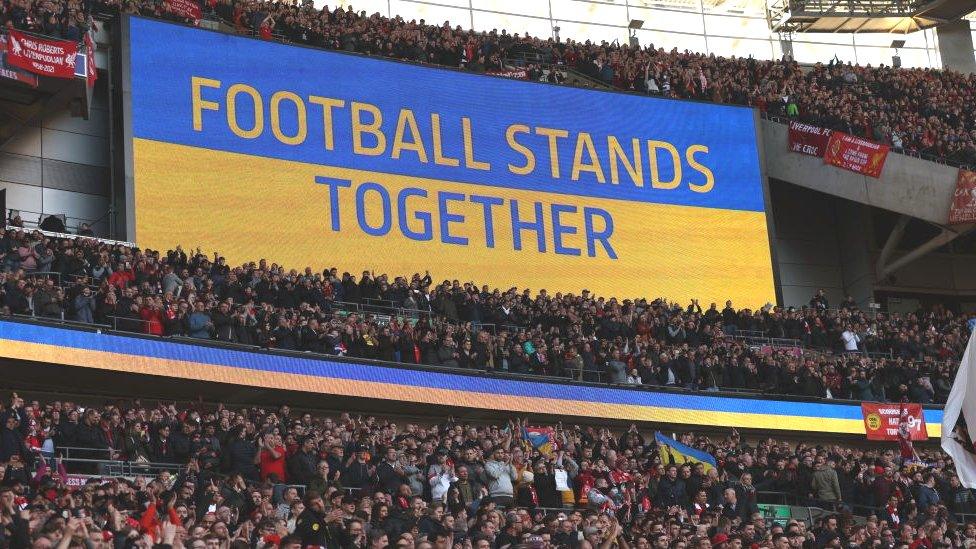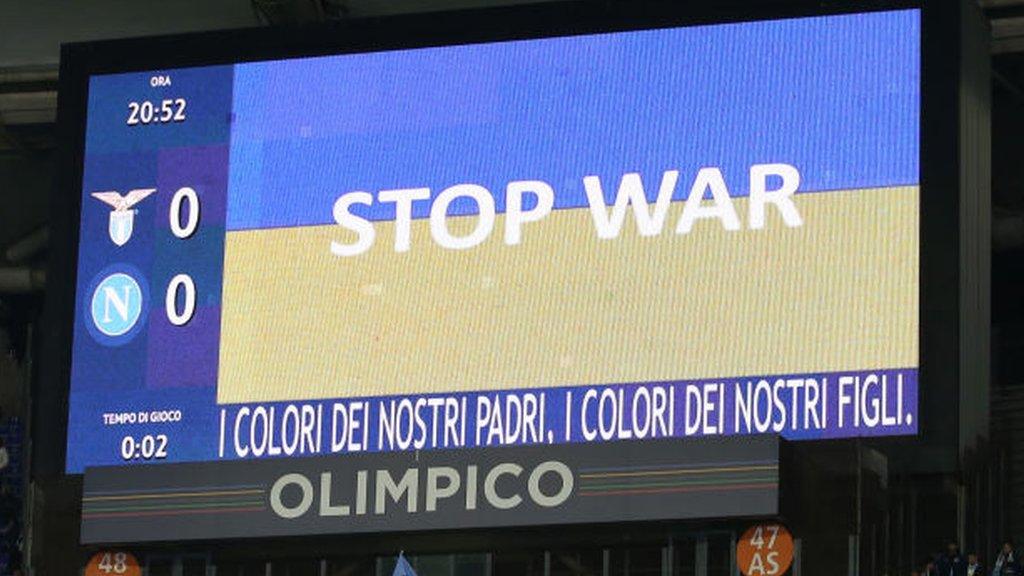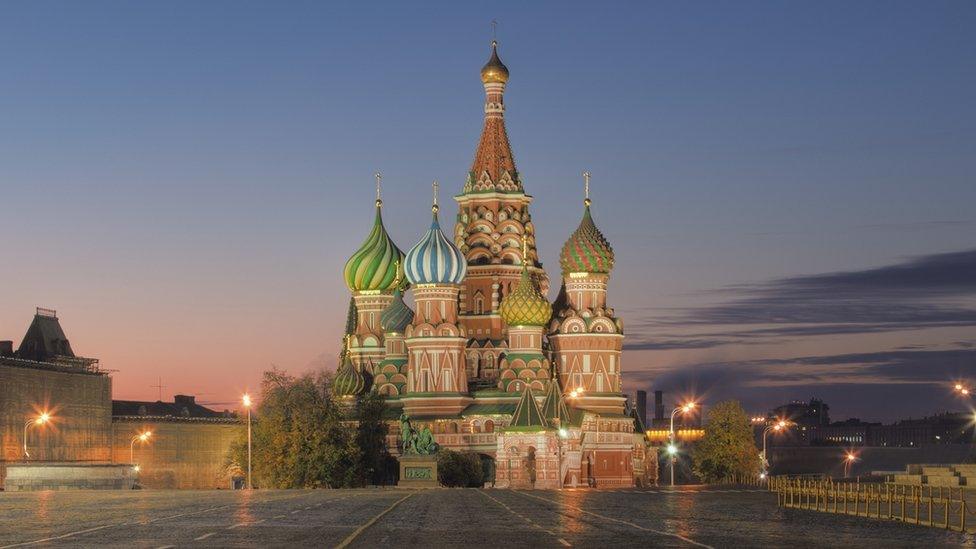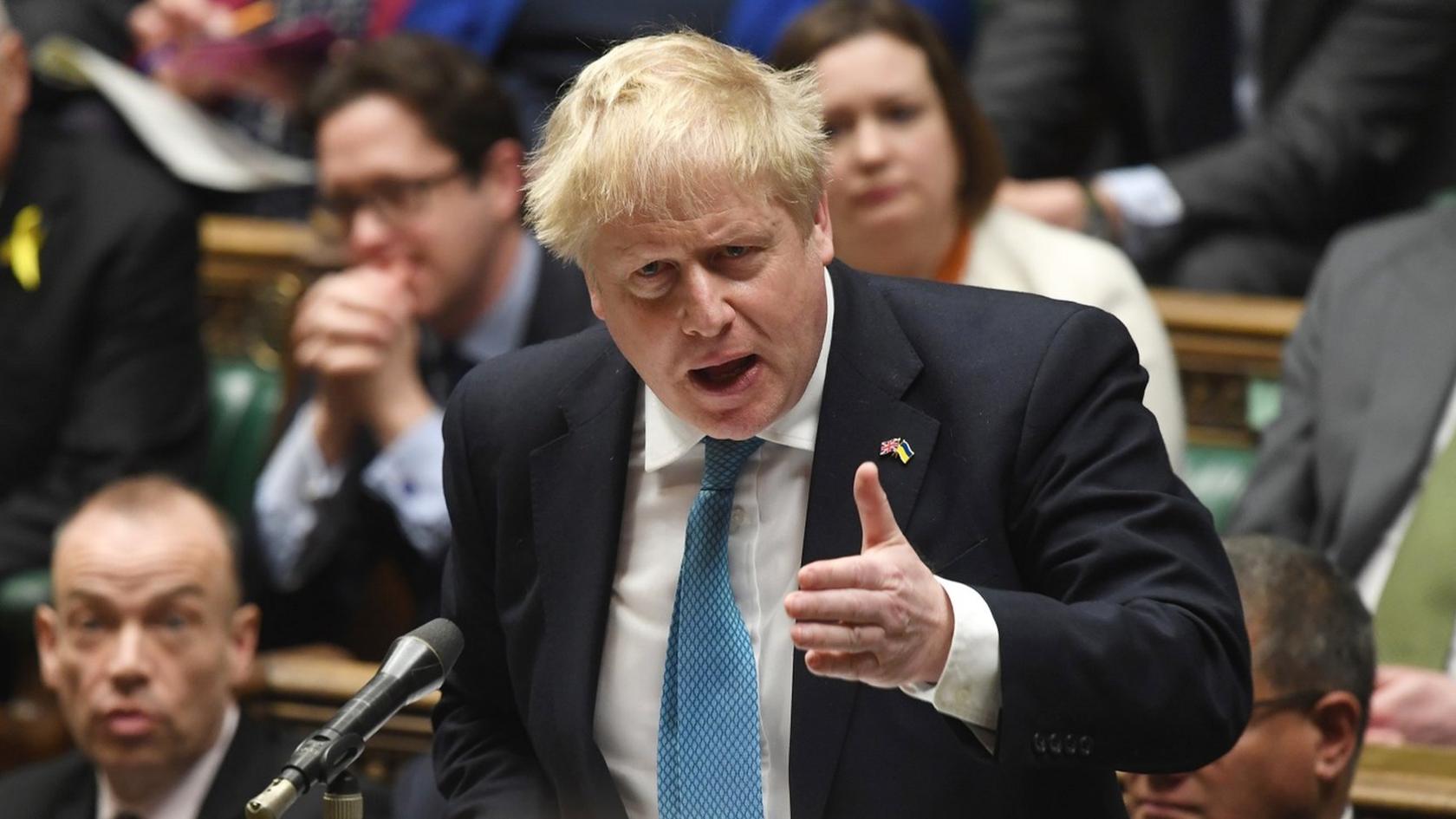Culture is third front in Ukraine war, says Nadine Dorries
- Published
- comments
Watch: Nadine Dorries' emotional tribute to UK journalists in Ukraine
UK ministers are meeting international allies to "ratchet up the pressure" on Vladimir Putin by taking more sporting, cultural and economic steps in the wake of Russia's invasion of Ukraine.
The culture secretary will try to mobilise more support to isolate Moscow at a summit of global sports ministers.
Nadine Dorries said culture was "the third front in the Ukrainian war".
And Foreign Secretary Liz Truss said the West must "keep our foot on the gas" with economic measures.
She was speaking while meeting her counterparts from Estonia, Latvia and Lithuania in Vilnius to show support on Nato's eastern flank.
Unlike Ukraine, the three Baltic countries are members of the defensive military alliance and joined after the collapse of the former Soviet Union.
Russian attacks on Ukrainian cities have intensified in recent days, with heavy shelling in the capital Kyiv, the second city Kharkiv and Kherson in the south.
On Wednesday, the mayor of Kherson said Russian forces had seized control of the key port - the first major city to be taken by Moscow after it invaded Ukraine a week ago.
Ms Dorries told the House of Commons: "Later today I'll be hosting a summit with countries from all over the globe to discuss how we can continue to use the power of sport to isolate Putin at home and abroad.
"We have to keep ratcheting up the pressure. Putin must fail."
She added: "I continue to push for organisations to exile Putin's Russia from their ranks."
The virtual summit will include sports ministers from 11 countries, including the US, Australia, Germany and Poland, who are expected to discuss banning teams and individuals representing Russia from international competitions and barring Russia and its ally Belarus from hosting global sporting events.
Athletes from Russia and Belarus will no longer be allowed to compete at the 2022 Winter Paralympics in Beijing, the International Paralympic Committee has confirmed.
The IPC had been heavily criticised after announcing on Wednesday that the athletes could compete as neutrals, but the committee announced the change on Thursday, saying the situation in the athlete villages had become "untenable".
"I welcome the fact that overnight they have listened and have reversed that decision this morning," Ms Dorries said.

Football fans in the UK have shown their support for Ukraine
Other changes to cultural and sporting events, designed to isolate Russia, include:
moving the the Champions League final from St Petersburg
the cancellation of the Russian Formula 1 Grand Prix
sporting bodies including Fifa, Uefa and the International Tennis Federation banning Russian teams from competitions
banning Russia from taking part in this year's Eurovision Song Contest
Mr Putin is now "suffering a sporting and cultural Siberia of its own making", the culture secretary said.
She also welcomed the removal of Russian news channel RT from TV screens in the UK and most of Europe.
She said she hoped UK media regulator Ofcom would revoke RT's licence "so that they're never again able or have the platform to broadcast their propaganda into the UK". She has also asked TikTok and Facebook's owner Meta to block RT's content.
Ms Dorries became visibly emotional during her Commons address as she offered her "heartfelt thanks and admiration" to journalists working for the BBC, ITV and other news outlets, saying they were "risking their lives to bring us unbiased and accurate news from a live war zone".

Russia attacks Ukraine: More coverage
THE BASICS: Why is Putin invading Ukraine?
RUSSIA: Watching the war on TV
IN DEPTH: Full coverage of the conflict

The UK has also worked alongside Western allies to enact sweeping economic sanctions against Russian banks, businesses and individuals.
On Wednesday night, British officials said more sanctions against wealthy Russians could be expected in the days and weeks to come but there was a "real risk" of people moving their assets outside the UK pre-emptively if they thought they could be targeted.
The BBC has been told a range of areas are under discussion, including possibly seizing the property of oligarchs with ties to Russian President Vladimir Putin, which Housing Secretary Michael Gove raised with cabinet ministers last week. However, no final decisions have been made.
Related topics
- Attribution
- Published18 March 2022

- Published23 February 2024

- Published2 March 2022
